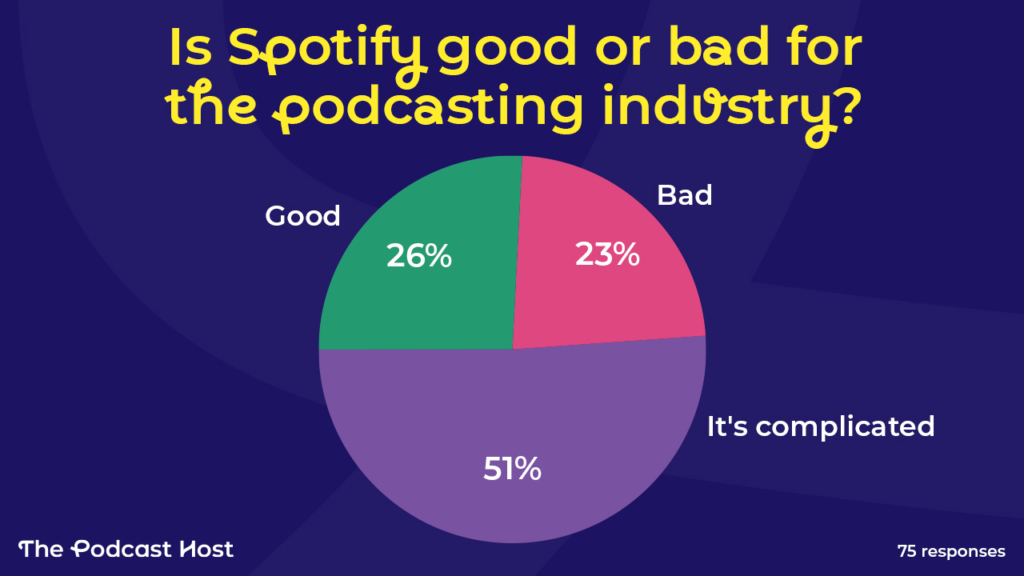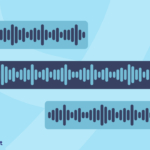Podcasters Share Views on ‘Complicated’ Relationship With Spotify
Unless you’ve been podcasting from under a rock, you’ll know that a lot has been going on at Spotify headquarters lately.
One minute the streaming giant is investing heavily in the podcast industry and announcing healthy positive growth.
The next minute, it’s laying off another 17% of its staff and axing some of its most successful podcasts.
On the same day that Heavyweight was announced as one of the New York Times’ best podcasts of 2023, Spotify axed the show. They also announced that day that they wouldn’t be renewing their contract with Stolen, which won the Pulitzer Prize for audio reporting this year.
It’s all a bit confusing and undeniably bleak. But there’s also no denying that Spotify’s move into podcasting has done some good for the industry, too.
With all this drama going on, we wanted to know what you, the independent podcaster, really think about the impact Spotify is having on the industry right now. And here’s what we learned.
What Do Independent Podcasters Think About Spotify?
We asked independent podcasters in our community and readers of our industry news and analysis what they think about the impact of Spotify.
Of the 75 podcasters we asked, 26% said they thought Spotify was good for the industry, 23% thought it was bad, and 51% said the relationship was too complicated to choose either good or bad.

These results aren’t so surprising. With so many contradictions going on at Spotify HQ, it seems that podcasters are just as confused as they are.
But what I found really interesting were the comments many podcasters shared when completing the short survey. They clarify exactly why the relationship between Spotify and podcasting is so complicated. Here are some highlights:
Why podcasters think Spotify is GOOD for the industry
1. Spotify improves audience reach
There’s absolutely no denying that Spotify’s move into podcasting has done great things for hooking new listeners into the format.
Previously, listening to podcasts was a bit of a proactive effort: Listeners would head over to Apple Podcasts or another podcast listening app to find and listen to podcasts. But to get to that stage, you already had to be aware and interested in podcasts.
But then, Spotify changed this up. They integrated podcasts into their platform, which was already being used by millions of listeners for streaming music. Suddenly, podcast recommendations were appearing in millions of Spotify feeds – including for users who’d never listened to a podcast in their lives.
Of those respondents to the survey who said they thought the platform was ‘good’ for podcasting, the large majority said it was because of “easy access“, its “huge audience“, and great “visibility“.
As one podcaster put it, “Spotify represents a capacity to achieve a higher audience, with new listeners not used to using podcast aggregators.”
We really can’t underestimate what this has done for increasing podcast visibility.
But for many independent podcasters who took the survey, the positive aspects of Spotify begin and end with visibility: “As an indie podcaster, I don’t benefit directly except for expanding the audiences open to podcasting.”
2. Spotify offers innovative technology
When you compare Spotify to other podcast listening and hosting platforms, it’s head and shoulders above the rest in terms of feature development. Apple is notoriously slow with releasing updates for the podcast app (but has gained momentum a bit in recent years, presumably to compete with Spotify).
For example, Spotify bought Anchor a while ago, has an integration with Megaphone that allows podcasters to monetize their content and a neat integration with Patreon.
So, it’s unsurprising that a few podcasters cited Spotify’s technology as a major plus point. “Spotify has launched good quality podcasts and very interesting interactive features,” one podcaster said.
It’s also doing a lot with AI that podcasters can benefit from (but be sceptical of, too). As one survey respondent said, “If the AI is properly used, then it is great“.
It’s not just about providing great technology for podcasters, but for listeners too. This comment captures just how important it is to make the listening experience easy, which Spotify does really well:
“Something I notice is that ALL my friends/family/circle listen to podcasts on Spotify. It seems like the platform offers them exactly the features they are interested in (the simple ones: timer, possibility to queue and speed). The few people I know who do not listen to podcasts on Spotify are either podcasters themselves or tech-oriented people.“
3. It’s disrupting the industry
For better or for worse, there’s no denying that Spotify has been disrupting the industry since it went into podcasting.
While a lot of this disruption has had negative consequences (more on that in the next section), there are a few positives that have come out of it, too.
For example, one podcaster pointed out that “Apple should not have a monopoly on podcast recommendations”.
Another said Spotify’s “closed ecosystem is firing up other organizations in the industry to do things differently, which is good. Their closed ecosystem is not so good in and of itself.”
Which takes us to the other side of the argument.
Why Podcasters Think Spotify is BAD for the Industry
1. Spotify thinks it’s above podcast industry standards
We’ve talked already about the positive way Spotify is disrupting podcasting, but what about the bad stuff?
Well, Spotify’s move into podcasting seems to have essentially involved ripping up the podcasting rule book and doing whatever it wants.
As we covered in a recent article, keeping podcasting open is extremely important. It’s at the core of how this industry operates. But Spotify’s podcasting strategy has been very much about banking exclusive shows, forcing listeners to only listen on their platform. And once they get bored, they drop these exclusive shows with no consequence.
As our survey respondents said, “Spotify’s “Exclusive” offerings are not good for Podcasting“, and they “don’t seem to care about podcast standards and openness.” In fact, they seem to be proactively “working against open industry standards.“
As one respondent put it, “the platform clearly is not aligned with other major players fostering an open eco-system” and there’s danger in that.
2. Spotify doesn’t support indies
One thing that’s glaringly clear about Spotify is that it doesn’t care about smaller, independent creators (as much as it might try to make us think it does).
Just last month, Spotify announced that from 2024, it would only start paying artists for music streams once they’d accumulated more than 1,000 listens. This is not the strategy of a company that cares about independent creators.
Clearly, there’s no pulling the wool over indiepodders’ eyes. There were a whole bunch of comments about this:
“Spotify with its high-ticket/celebrity-driven shows has made it difficult for independent/grass roots podcasters to get a foothold in the industry“
“They don’t really help support small creators“
“Spotify only prioritizes its own podcasts, making us, independent creators, more difficult to find.”
3. Exploiting podcasts for profits
And lastly, there’s the issue of profitability. Or specifically, Spotify’s apparent obsession with profitability.
Of course, all corporations are obsessed with profit, but there’s a lot about Spotify’s erratic market behaviours that screams this is all they care about.
For example, they buy up exclusive podcasting deals then axe them, hugely expand the company then regularly lay people off in their hundreds, change how they charge listeners, and pay creators in a way that they’re the only ones who benefit.
I’ll finish with this final quote from the survey, which I think sums it up well:
“Profit is their first goal. They disguise this with “helping artists” branding, and use podcasts to puff up the numbers regarding content. They load podcasts with ads and exploit podcasters because they can’t do the same thing to music companies.”
Spotify and Podcasting: It’s complicated
But as podcasters, is there anything we can learn from this? The best piece of advice to follow here would be to take advantage of the benefits Spotify has to offer podcasters (useful features, increased visibility), but don’t let Spotify dictate how you run your podcast.
It’s handy to keep in mind, too, that it isn’t the duty of Spotify (or any other platform) to grow your podcast. It’s an empowering mindset shift when you realise that the success of your show is heavily under your control. If you know your audience well, and keep serving them quality content on a consistent basis, then you don’t need to worry too much about what Spotify are up to.
That’s not to say you should ignore them completely, of course. It’s hard to argue against the fact that they’ve raised the profile of podcasting these past five years, and there may yet be some good opportunities for your show on the platform.
Likewise, any moves against open podcasting by big companies in the industry are a legitimate point of concern and should be challenged (you can do this by supporting the Podcast Standards Project.)
Some will go as far as to claim that you shouldn’t even list your podcast on Spotify. But ask yourself who that’s going to hurt more: you or them?

